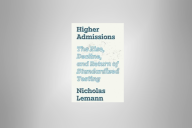You have /5 articles left.
Sign up for a free account or log in.
WASHINGTON -- A bill under consideration in Congress could make it easier for federal prosecutors to bring criminal charges against academic libraries for unduly making copyrighted materials available to students, according to a letter sent to lawmakers on Tuesday by a group of influential library associations.
The bill, called the Stop Online Piracy Act (H.R. 3261), or SOPA, stipulates that “any person who willfully infringes a copyright” can be charged with a felony “if such a person knew or should have known that the work was intended for commercial dissemination.”
SOPA, a more sprawling version of the Senate’s proposed Protect-IP Act, garnered a lot of buzz when it was introduced by the House Judiciary Committee last month. Now, in advance of a Nov. 16 Judiciary Committee hearing, the Library Copyright Alliance -- a group made up of the American Library Association, the Association of Research Libraries, and the Association of College and Research Libraries -- has stamped its seal on a letter to members of the committee expressing “serious concerns” about its implications for university libraries.
The bill would “increase the exposure of libraries to prosecution,” the associations say.
The letter mentions several civil lawsuits currently being litigated against universities over alleged copyright violations by their libraries: Cambridge University Press v. Patton, in which several publishers are seeking a crackdown on e-reserve practices at Georgia State University; Authors Guild v. HathiTrust, in which authors are trying to stop the University of Michigan library and its partners from building a digital repository that includes copyrighted books; and Association of Information Media and Equipment v. Regents of the University of California, in which an educational film trade group is attempting to block the University of California at Los Angeles from streaming copyrighted videos on password-protected course websites.
“In this environment, the criminal prosecution of a library for copyright infringement is no longer beyond the realm of possibility,” the library advocates say in the letter. And they say the wording of the SOPA bill might give a U.S. attorney’s office the necessary ammunition to bring such charges.
Specifically, the libraries are troubled by what they see as an attempt to conflate liberal readings of the U.S. Copyright Law -- in particular, the “fair use” exemptions accorded to educational institutions — with “willful infringement,” which can carry criminal penalties.
Copyright law distinguished three levels of copyright infringement: innocent, ordinary, and willful infringement, explains Brandon Butler, director of public policy initiatives for the Association of Research Libraries and author of the letter. “Ordinary” infringement is when a violator “believed his action was non-infringing but this belief was unreasonable” in the eyes of a court, Butler says. “Willful” infringement is undertaken in bad faith, and violators can be forced to pay up to $150,000 in damages (although, notably, a court can waive those fines in the case of nonprofits such as libraries and universities).
Under the current language of the SOPA bill, Butler and his fellow advocates say, “The willful infringement level would swallow the ordinary infringement level, thereby significantly broadening the range of activities subject to criminal sanctions.”
The letter also points to a line in the SOPA bill that makes “public performances” of copyrighted works a potentially criminal offense even when the violator is not making money from “performing” the work.
Under the current copyright regime, ”A willful infringer of the public performance right can only be subject to misdemeanor (as opposed to felony) sanctions, and only if the infringement was for purposes of commercial advantage or private financial gain,” writes Butler. Under a SOPA regime, institutions that commit “public performances” that a court deems unlawful might be charged with a felony, he says.
This last concern is given immediacy by a recent ruling in the case of Association of Information Media and Equipment v. the Regents of the University of California. A federal judge ruled that streaming Shakespeare films on a secure course website constituted a public performance of those copyrighted works -- the same as screening them during class. Because the specific contract between the publisher of the Shakespeare films and UCLA permitted public performances, the judge threw out the case. (The ruling did not address whether public performances were covered by the fair use exemptions in general.) The association has since refiled the lawsuit.
Most of the supporting rhetoric behind the SOPA bill has focused on foreign websites that support unauthorized downloading of copyrighted media files, while its critics, who include the Electronic Frontier Foundation and the Open Internet Coalition, have tended to focus on big-picture themes such as the hazards of attempting to “regulate the Internet.” The objections of the Library Copyright Alliance might seem peripheral by comparison. At the same time, their requests are accordingly narrow and prescriptive:
The relevant passages “should be amended to eliminate any possible negative implication that broadens the scope of willfulness” and “so that they do not apply to streaming and other public performances for non-commercial purposes,” the letter concludes.
A spokeswoman for Rep. Lamar Smith, a Texas Republican who is the lead sponsor of the bill, did not return requests for comment regarding the concerns of the library associations.
For the latest technology news and opinion from Inside Higher Ed, follow @IHEtech on Twitter.








